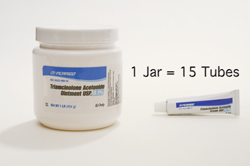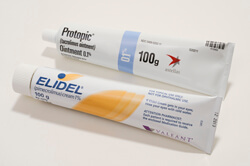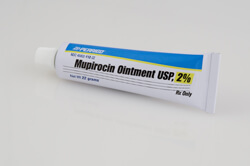Eczema: Treatment
This information was reviewed and approved by Jessica Hui Beckman, MD (4/1/2024).
A variety of prescribed topicals are available for eczema treatment, in addition to over-the-counter medications, such as various cream and ointment moisturizers. Medicines are added to your daily skin care when itching and rash from atopic dermatitis are not well controlled. Medication is also required if there is an infection.
Eczema Medication
Topical Steroids
.jpg) Steroid medicines that are applied to the skin are called topical steroids. Topical steroids are drugs that fight inflammation. They are very helpful when rash is not well controlled. Topical steroids are available in many forms for treatment of eczema such as ointments, creams, lotions, gels and even tape. It is important to know that topical steroids are made in low to super potent strengths. Do not substitute one topical steroid for another without your healthcare provider's advice. Used correctly, topical steroids are safe and effective treatment for atopic dermatitis. Steroid pills or liquids, such as prednisone, should be avoided because of side effects and because the rash often comes back after they are stopped.
Steroid medicines that are applied to the skin are called topical steroids. Topical steroids are drugs that fight inflammation. They are very helpful when rash is not well controlled. Topical steroids are available in many forms for treatment of eczema such as ointments, creams, lotions, gels and even tape. It is important to know that topical steroids are made in low to super potent strengths. Do not substitute one topical steroid for another without your healthcare provider's advice. Used correctly, topical steroids are safe and effective treatment for atopic dermatitis. Steroid pills or liquids, such as prednisone, should be avoided because of side effects and because the rash often comes back after they are stopped.
 Topical Clacineurin Inhibitors (TCIs)
Topical Clacineurin Inhibitors (TCIs)
TCIs are also medicines that are applied to the skin for the treatment of eczema. They also treat inflammation, but are not steroids. TCIs don't cause steroid side effects. A common side effect of TCIs is skin burning. This is often not a long-lasting problem. TCIs include Protopic® ointment (tacrolimus) and Elidel® cream (pimecrolimus).
Topical JAK Inhibitor
Topical ruxolitinib 1.5% cream is approved for patients 12 years of age and older whose atopic dermatitis is not adequately controlled with topical prescription therapies or when they cannot use those therapies.
Topical PDE4 Inhibitors (PDE4)
A topical phosphodiesterase 4 inhibitor (PDE4) is a medicine that is applied to the skin to treat inflammation, but is not a steroid. This is approved for children 3 months of age and older with mild to moderate atopic dermatitis. PDE4s include Eucrisa® (crisaborole).
Oral JAK Inhibitors
There are oral JAK inhibitors available for patients 12 years of age and older, such as abrocitinib and upadacitinib. Patients treated with these medications need to have blood work screening, with monitoring of certain blood tests while on treatment.
Biologics
Dupixent® (dupilumab)
This biologic is a medicine that is given as a routine shot. It was first approved for adults with atopic dermatitis in 2017 and is now approved for patients 6 months and older with moderate to severe atopic dermatitis.
Adbry® (tralokinumab)
This biologic medication is given as a routine shot and is approved for patients 12 years of age and older with moderate to severe atopic dermatitis.
Tar-based soaps and shampoos for Eczema
Skin and scalp products that contain coal-tar extracts have long been used to treat and reduce itching and rash. Tar shampoos, such as T-Gel®, are often helpful for red and itchy scalp. For scalp scaling or flaking, T-Sal® or Head and Shoulders® may be helpful.
 Anti-infectives
Anti-infectives
Skin infections caused by bacteria (e.g. impetigo), fungus (e.g. athlete's foot) and viruses (e.g. cold sores) can complicate the treatment of eczema symptoms. Some antibiotics, antifungal and antiviral medications are applied to the skin; others are pills or liquids taken by mouth. A skin infection can quickly get out of control. Call your healthcare provider right away if you think you have an infection.
Antihistamines
Antihistamines taken by mouth are used to control allergy symptoms and can help reduce itching from atopic dermatitis. Some antihistamines cause drowsiness. This can make you feel less itchy and help you sleep. Eczema creams and lotions that contain antihistamines or anesthetics (for numbing) should be avoided. They can cause skin irritation and allergic skin reactions.
Barrier Repair Creams for Atopic Dermatitis
Several topical products that are not FDA regulated, but require prescriptions since they are registered as medical devices, have been developed for the treatment of itchy rashes caused by eczema. These include Epiceram®, Atopiclair®, MimyX®.
Soak and Seal Therapy for Atopic Dermatitis
The soak and seal procedure is an effective treatment to retain moisture in dry, irritated skin as a result of eczema. Learn more.
Treating Skin Infections
Infections with bacteria and viruses are common among eczema patients. For instance, over 90 percent of patients have the bacteria Staphylococcus aureus on their skin, and the breaks in the skin barrier caused by the rash and by scratching can lead to infection. Proper skin care measures directed at maintaining a healthy skin barrier are a key part of reducing bacterial colonization or infection. In addition, topical anti-inflammatory medications including steroids and calcineurin inhibitors reduce the ability of bacteria to bind to the skin.
For small, localized bacterial infections, a prescription topical antibiotic called mupirocin is often used. This is an ointment usually applied to the affected area three times per day for one to two weeks. The brand name of this drug is Bactroban®. Oral antibiotics are used for more extensive or more severe skin infections. A skin culture done with a cotton swab may be helpful to determine if bacteria are sensitive or resistant to different antibiotics. Methicillin-resistant staphylococcus aureus (MRSA) is becoming a more common problem for patients with atopic dermatitis.
Good skin hydration is also important in restoring the skin barrier to protect against infectious agents. Cleansers can also decrease skin colonization by bacteria. Some dermatologists have been prescribing dilute bleach baths, especially for patients with recurrent MRSA. However, these may be very irritating for some patients and since the nose is a main reservoir of staph bacteria, patients often get quickly re-colonized.
Wet Wrap Therapy for Eczema
When eczema symptoms are severe, your health care provider may suggest wet wrap therapy. These are dressings--often made from articles of clothing--that have been soaked in warm water with a dry layer applied on top. Face wraps are done by nurses trained in the procedure using gauze and surgical netting.
Apply wet wraps to skin after soaking and sealing and after applying topical steroid medicine. The wraps help keep skin moist and improve effectiveness of topical medicine. They also have a cooling anti-itch effect. Rewet or take the wraps off when they start to dry out. This should be done under medical supervision for short periods of time and only to the more severe eczema, and the patient should be observed for signs of skin infection. Read and watch a video about our study on wet wrap therapy. You can learn more about how we treat pediatric patients by visiting our Day Program page.
Phototherapy
Exposure to natural sunlight or ultraviolet light often helps people with eczema. However, it can be counterproductive if at the same time patients are exposed to heat and humidity, which causes them to perspire and itch or get sunburned.
Phototherapy with many different types of ultraviolet light may be prescribed, such as broad-band ultraviolet B, broad-band ultraviolet A, narrow-band UVB, or combined UVAB light. Tanning beds are not an appropriate eczema therapy. This treatment should be used in conjunction with other therapies. It also should be reserved for patients with especially severe atopic dermatitis because of potential long-term adverse effects, including premature aging of the skin and skin cancer.
Psychological Counseling
People with eczema often struggle with a poor self-image and low self-esteem. In severe cases, the appearance of their skin can invite teasing and, especially with children, interfere with peer relationships. The sleep disturbances that may accompany atopic dermatitis put added stress on individuals and those closest to them, with significant impact on quality of life.
Eczema patients who are experiencing a lot of stress may benefit from psychological counseling or even from taking antianxiety drugs. Relaxation therapy and biofeedback also can be helpful for people who are finding it hard to control their scratching.
Day Hospitalization
Day hospitalization at centers specializing in treatment of eczema can be helpful for patients whose rashes are not controlled by medications and by avoiding irritants.
 Clinical Trials
Clinical Trials
For more than 100 years, National Jewish Health has been committed to finding new treatments and cures for diseases. Search our clinical trials.
